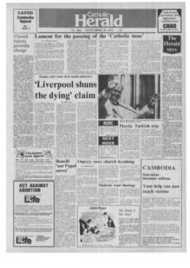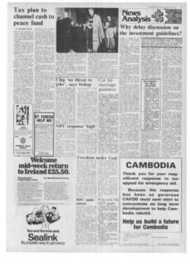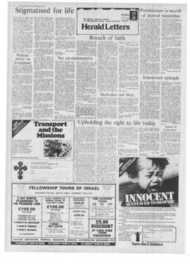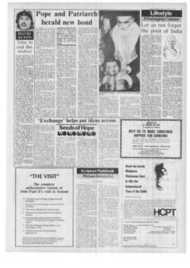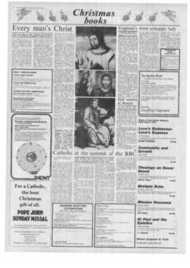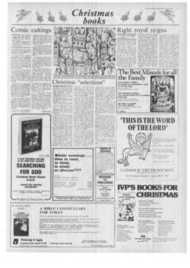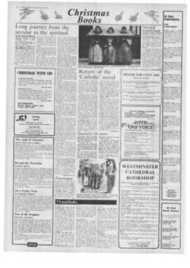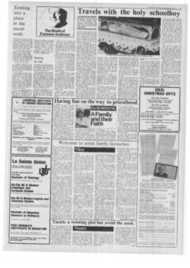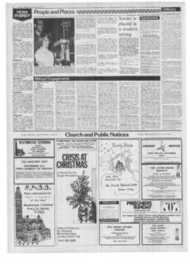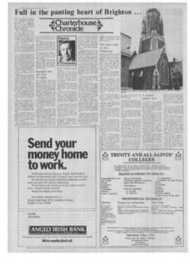Page 3, 30th November 1979
Page 3
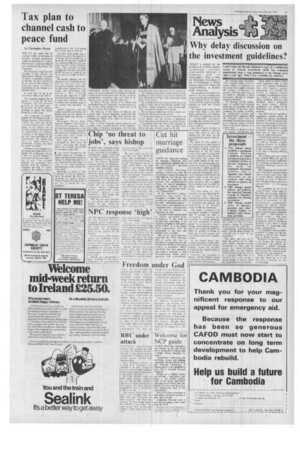
Report an error
Noticed an error on this page?If you've noticed an error in this article please click here to report it.
Tags
Share
Related articles
Jail Could Face Tax Protestors
Arms Campaigners Press On With Peace Tax Scheme
Military Conscription In Tax Terms
Peace Tax Campaign In Italy Row
Thinking About Peace After Involvement In Falklands
Tax plan to channel cash to peace fund
by Christopher Howse
THE £12 per week that an average family of four pays in taxation towards armaments could be diverted to a peace fund under a scheme outlined in a booklet by the Peace Tax Campaign.
The proposals, which have the backing of Pax Christi, the international Catholic movement for peace, would allow taxpayers to indicate that they wanted the 40 per cent of their income tax presently going to defence expenditure to go instead to a separate fund.
It would then be up to the government what to do with it.
The campaign suggests that in answer to a call by Dr Kurt Waldheim, the UN secretary general, to set aside one thousandth of their defence spending on peace, the money should go to this cause.
, The campaign is masterminded by Mr Stanley Keeble, a lifelong member of the Society of Friends. His claim that 40 per cent of income tax goes to arms is based on the simple sum of dividing receipts from income tax by expenditure on defence, according to the figures for the last two years provided by the Government. He admits that there are other sources of government revenue, but these are harder to isolate.
The Peace Tax Campaign is not advocating the withholding of tax illegally, but is calling for a change in the law to give freedom of conscience to those who object to war. It says: "The accepted principle of exemption from fighting shall be updated to recognise also that in modern conditions the ordinary citizen's contribution to war is in piling for it rather than in fighting. '
Just ho W much people pay to arniaments, given the proportion of 40 per cent of income tax, is shown by the fact that a married man earning £4,000 per year pays more than £5 a week to defence costs. The national average earnings for men were more than £4,200 last year. A family of four has to pay an average of £616 a year.
,Mr Keeble admitted that the proposals were revolutionary, but saw no reason why the Government should reject them. In 1916, when jingoism was at its height, the Government had passed a Bill allowing conscientious objection. a right which had since been recognised in many other countries. "We do not believe the spiritual values of our society have declined." he said.
Against suggestions that the system.would be unworkable, Mr Keeble said that tax refunds for charitable funds were already in operation.
Monsignor Bruce Kent, National Chaplain of Pax Christi, welcomed the proposals. "This is an important development in the idea of conscientious objection and need not necessarily lead to claims from every kind of pressure group." he said.
The idea has also been welcomed by MPs from all parties, including Mr David Alton, the Catholic liberal MP for Liverpool, Edge Hill.
• Last week's decision by the British Council of Churches to oppose the Government's plans to replace the Polaris H-bomb force was described by Mgr Kent as "one of the most significant developments in the Church for many years," Speaking on behalf of the Campaign for Nuclear Disarmament, he praised the BCC for speaking out against British nuclear weapons and said its decision war "a victory for commonsense,"
blog comments powered by Disqus


